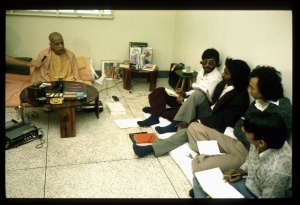SB 7.11.33-34: Difference between revisions
m (1 revision(s)) |
(Vanibot #0018 edit: make synonym terms in Sanskrit italic in SB - Vanisource) |
||
| Line 1: | Line 1: | ||
{{info | {{info | ||
|speaker= | |speaker=Nārada Muni | ||
|listener=King | |listener=King Yudhiṣṭhira | ||
}} | }} | ||
[[Category:Srimad-Bhagavatam - Canto 07 Chapter 11]] | |||
[[Category:Bhagavatam Verses Spoken by Narada Muni - Vanisource|071133]] | |||
<div style="float:left">'''[[Srimad-Bhagavatam]] - [[SB 7|Seventh Canto]] - [[SB 7.11: The Perfect Society: Four Social Classes|Chapter 11: The Perfect Society: Four Social Classes]]'''</div> | |||
<div style="float:right">[[File:Go-previous.png|link=SB 7.11.32]] '''[[SB 7.11.32]] - [[SB 7.11.35]]''' [[File:Go-next.png|link=SB 7.11.35]]</div> | |||
{{RandomImage}} | |||
==== TEXTS 33-34 ==== | ==== TEXTS 33-34 ==== | ||
<div | <div class="verse"> | ||
upyamānaṁ muhuḥ kṣetraṁ | :upyamānaṁ muhuḥ kṣetraṁ | ||
svayaṁ nirvīryatām iyāt | :svayaṁ nirvīryatām iyāt | ||
na kalpate punaḥ sūtyai | :na kalpate punaḥ sūtyai | ||
uptaṁ bījaṁ ca naśyati | :uptaṁ bījaṁ ca naśyati | ||
evaṁ kāmāśayaṁ cittaṁ | |||
kāmānām atisevayā | :evaṁ kāmāśayaṁ cittaṁ | ||
virajyeta yathā rājann | :kāmānām atisevayā | ||
agnivat kāma-bindubhiḥ | :virajyeta yathā rājann | ||
:agnivat kāma-bindubhiḥ | |||
</div> | </div> | ||
| Line 21: | Line 27: | ||
==== SYNONYMS ==== | ==== SYNONYMS ==== | ||
<div | <div class="synonyms"> | ||
''upyamānam''—being cultivated; ''muhuḥ''—again and again; ''kṣetram''—a field; ''svayam''—itself; ''nirvīryatām''—barrenness; ''iyāt''—may obtain; ''na kalpate''—is not suitable; ''punaḥ''—again; ''sūtyai''—for growing further harvests; ''uptam''—sown; ''bījam''—the seed; ''ca''—and; ''naśyati''—is spoiled; ''evam''—in this way; ''kāma-āśayam''—full of lusty desires; ''cittam''—the core of the heart; ''kāmānām''—of the desirable objects; ''ati-sevayā''—by enjoyment over and over again; ''virajyeta''—may become detached; ''yathā''—just as; ''rājan''—O King; ''agni-vat''—a fire; ''kāma-bindubhiḥ''—by small drops of clarified butter. | |||
</div> | </div> | ||
| Line 28: | Line 34: | ||
==== TRANSLATION ==== | ==== TRANSLATION ==== | ||
<div | <div class="translation"> | ||
My dear King, if an agricultural field is cultivated again and again, the power of its production decreases, and whatever seeds are sown there are lost. Just as drops of ghee on a fire never extinguish the fire but a flood of ghee will, similarly, overindulgence in lusty desires mitigates such desires entirely. | My dear King, if an agricultural field is cultivated again and again, the power of its production decreases, and whatever seeds are sown there are lost. Just as drops of ghee on a fire never extinguish the fire but a flood of ghee will, similarly, overindulgence in lusty desires mitigates such desires entirely. | ||
</div> | </div> | ||
| Line 35: | Line 41: | ||
==== PURPORT ==== | ==== PURPORT ==== | ||
<div | <div class="purport"> | ||
If one continuously sprinkles drops of ghee on a fire, the fire will not be extinguished, but if one suddenly puts a lump of ghee on a fire, the fire may possibly be extinguished entirely. Similarly, those who are too sinful and have thus been born in the lower classes are allowed to enjoy sinful activities fully, for thus there is a chance that these activities will become detestful to them, and they will get the opportunity to be purified. | If one continuously sprinkles drops of ghee on a fire, the fire will not be extinguished, but if one suddenly puts a lump of ghee on a fire, the fire may possibly be extinguished entirely. Similarly, those who are too sinful and have thus been born in the lower classes are allowed to enjoy sinful activities fully, for thus there is a chance that these activities will become detestful to them, and they will get the opportunity to be purified. | ||
</div> | </div> | ||
__NOTOC__ | |||
<div style="float:right; clear:both;">[[File:Go-previous.png|link=SB 7.11.32]] '''[[SB 7.11.32]] - [[SB 7.11.35]]''' [[File:Go-next.png|link=SB 7.11.35]]</div> | |||
__NOTOC__ | |||
__NOEDITSECTION__ | |||
Revision as of 05:38, 1 December 2017

A.C. Bhaktivedanta Swami Prabhupada
TEXTS 33-34
- upyamānaṁ muhuḥ kṣetraṁ
- svayaṁ nirvīryatām iyāt
- na kalpate punaḥ sūtyai
- uptaṁ bījaṁ ca naśyati
- evaṁ kāmāśayaṁ cittaṁ
- kāmānām atisevayā
- virajyeta yathā rājann
- agnivat kāma-bindubhiḥ
SYNONYMS
upyamānam—being cultivated; muhuḥ—again and again; kṣetram—a field; svayam—itself; nirvīryatām—barrenness; iyāt—may obtain; na kalpate—is not suitable; punaḥ—again; sūtyai—for growing further harvests; uptam—sown; bījam—the seed; ca—and; naśyati—is spoiled; evam—in this way; kāma-āśayam—full of lusty desires; cittam—the core of the heart; kāmānām—of the desirable objects; ati-sevayā—by enjoyment over and over again; virajyeta—may become detached; yathā—just as; rājan—O King; agni-vat—a fire; kāma-bindubhiḥ—by small drops of clarified butter.
TRANSLATION
My dear King, if an agricultural field is cultivated again and again, the power of its production decreases, and whatever seeds are sown there are lost. Just as drops of ghee on a fire never extinguish the fire but a flood of ghee will, similarly, overindulgence in lusty desires mitigates such desires entirely.
PURPORT
If one continuously sprinkles drops of ghee on a fire, the fire will not be extinguished, but if one suddenly puts a lump of ghee on a fire, the fire may possibly be extinguished entirely. Similarly, those who are too sinful and have thus been born in the lower classes are allowed to enjoy sinful activities fully, for thus there is a chance that these activities will become detestful to them, and they will get the opportunity to be purified.